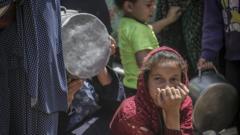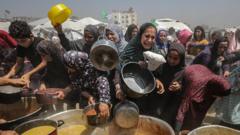*Internal military assessments indicate urgent need for restoration of aid to Gaza amidst ongoing conflict.*
**Gaza Faces Food Crisis Amidst Continued Israeli Blockade**

**Gaza Faces Food Crisis Amidst Continued Israeli Blockade**
*Israeli Military Warns of Starvation Threat as Humanitarian Aid is Stalled*
The latest reports from within the Israeli military indicate a stark reality for the Palestinian population in Gaza, as officials privately warn of a potential starvation crisis. Despite public assurances from the Israeli government that the blockade on food and fuel is not severely affecting civilian conditions, three defense officials revealed that without the immediate restoration of aid deliveries, many areas within Gaza could soon face dire food shortages.
For several months, Israel has upheld its blockade, often dismissing warnings from the UN and humanitarian organizations about the looming threat of famine. However, Israeli military personnel who are responsible for monitoring the humanitarian landscape in Gaza have recently conveyed alarming messages to their leadership: if aid is not swiftly reinstated, the situation will deteriorate to a point where minimum nutritional needs cannot be met. These officials, speaking anonymously to protect sensitive information, stressed the importance of expediting humanitarian supplies to avert catastrophic starvation.
This grave acknowledgment from parts of the Israeli defense community coincides with Prime Minister Benjamin Netanyahu’s announcement of an intention to intensify military actions aimed at eradicating Hamas and recovering hostages. Despite nearly 19 months of conflict, these goals remain unfulfilled. Netanyahu’s defiant remarks coincide with U.S. President Donald Trump’s recent diplomatic visit to Saudi Arabia, emphasizing a growing rift between Israeli and American perspectives on security strategies in the region, particularly concerning the ongoing humanitarian crisis in Gaza.
For several months, Israel has upheld its blockade, often dismissing warnings from the UN and humanitarian organizations about the looming threat of famine. However, Israeli military personnel who are responsible for monitoring the humanitarian landscape in Gaza have recently conveyed alarming messages to their leadership: if aid is not swiftly reinstated, the situation will deteriorate to a point where minimum nutritional needs cannot be met. These officials, speaking anonymously to protect sensitive information, stressed the importance of expediting humanitarian supplies to avert catastrophic starvation.
This grave acknowledgment from parts of the Israeli defense community coincides with Prime Minister Benjamin Netanyahu’s announcement of an intention to intensify military actions aimed at eradicating Hamas and recovering hostages. Despite nearly 19 months of conflict, these goals remain unfulfilled. Netanyahu’s defiant remarks coincide with U.S. President Donald Trump’s recent diplomatic visit to Saudi Arabia, emphasizing a growing rift between Israeli and American perspectives on security strategies in the region, particularly concerning the ongoing humanitarian crisis in Gaza.





















